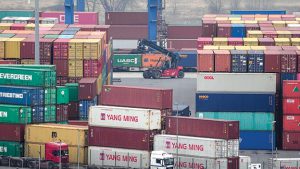Bloomberg
The euro area economy kicked off 2022 on a weak footing, with pandemic restrictions taking a toll on confidence and growing fears that Germany may be on the brink of a recession for the second time since the crisis began.
A sentiment gauge by the European Commission fell to 112.7 in January, the lowest in nine months, driven by declines in most sectors and among consumers. Employment expectations dropped for a second month.
The report follows grim news from Germany showing output in the fourth quarter shrank 0.7% — more than twice as much as economists predicted. On the bright side, France and Spain reported faster-than-expected growth.
Europe is lagging the US and the UK in recovering from the pandemic, with supply bottlenecks hitting manufacturing, coronavirus curbs impacting services and personnel shortages disrupting all parts of the economy. The International Monetary Fund this week cut its euro-area outlook for the year and warned inflation will persist longer.
Impatience about record price pressures is already testing policy makers at the European Central Bank, who point to a surge in energy they can’t control. Governments have stepped into the breach by offsetting higher costs for consumers to prevent a spending squeeze that may still materialize if escalating tensions at the Russia-Ukraine border send prices even higher.
Services providers and retailers expect to raise prices in the coming months, the Commission survey showed. Consumers turned more pessimistic about their future financial situation.
Manufacturers expect selling prices to ease. At the same time, order books declined slightly in January, while production expectations remained broadly unchanged.
A survey of purchasing managers showed earlier this week that supply-chain snarls are starting to ease. While automakers from Volkswagen AG to Stellantis NV expect that trend to continue, they’ve also warned microchips will remain scarce in the first half.
At the same time, strict Covid-19 controls in China and much of the rest of Asia could yet derail progress if factory closures similar to the ones idling plants in the port city of Tianjin become the norm. Almost half the world’s nations trail vaccination targets set by the IMF. Companies in the euro area already expressed concern that staff absences due to illness or quarantine rules risk inhibiting activity.
The region started 2022 with the tightest coronavirus curbs since May, according to IHS Markit. These restrictions mostly affect retailers, hospitality providers and other services.
In January, sentiment in services suffered from disappointing past business and demand. Private consumption declined in Germany and Spain at the end of last year, while French consumers gave their economy a boost.
An update from the ECB on economic prospects in the months ahead will be available next week when President Christine Lagarde reports on the outcome of the Governing Council’s policy meeting.
Policy makers have already said they see no reason for a fundamental change of course following their pledge to end emergency bond-buying in March and slow down purchases over the remainder of the year.
 The Gulf Time Newspaper One of the finest business newspapers in the UAE brought to you by our professional writers and editors.
The Gulf Time Newspaper One of the finest business newspapers in the UAE brought to you by our professional writers and editors.
